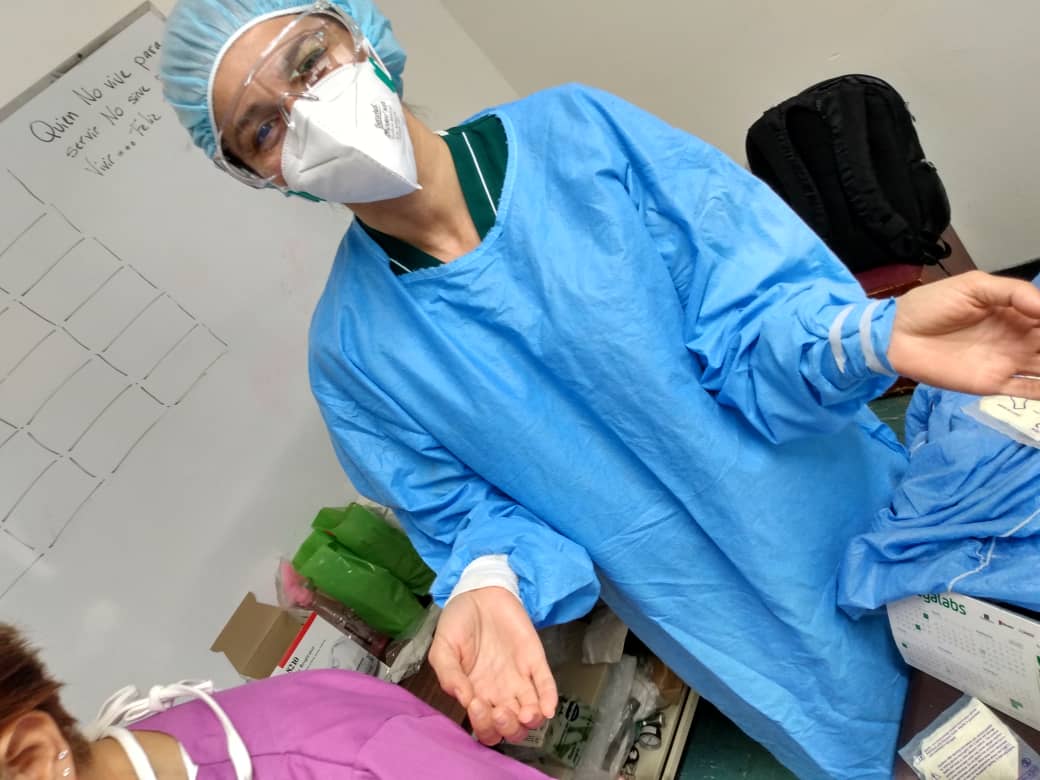
Photo Credt: Dr Jueida Azkoul
As we in Canada transition into a gradual opening up from Covid restrictions Venezuelans are facing an escalating Covid 19 crisis on top of years of food and medicine shortages, chronic malnutrition, unemployment, hyperinflation and political instability. Over the past 5 years Venezuelans have lost thousands of doctors and nurses and experienced chronic shortages of medicines and medical supplies leading to increases in many infectious diseases such as malaria, HIV, TB, diphtheria and measles and frequent inadequate management of acute and chronic medical problem.
The addition of the Covid 19 pandemic onto this fragile , vulnerable Venezuelan population is very concerning. It is impossible to estimate the prevalence of Covid 19 in Venezuela today as there are severe shortages of testing capabilities, contact tracing, PPE, medicines, ventilators and general hospital and ICU capacity.
It is concerning that the number of reported cases of Covid in Venezuela to WHO as of today is 459 with 10 deaths…in a population of 29 million ( 4 million people have left over past 5 years).
To put things in perspective, New Zealand, with a population of 4.8 million have reported 1498 cases and 21 deaths to date.
Neighbours such as Brazil have reported 220,291 cases( 6th highest in world) and 14,962 deaths, Colombia 14,216/ 546 deaths, Peru 84,495/ 2392 deaths, Ecuador 31,467/2594 and Chile 39,542/ 394
Tightening international sanctions, significantly reduced global oil prices and a poorly diversified national economy contributes significantly to a disastrous response to the Covid crisis.
The IMF recently rejected a Venezuelan request for $5 billion to support a Covid 19 response within Venezuela because of the uncertain political situation.
I am attaching a short video sent by some amazing medical colleagues who have chosen to stay in Venezuela to help their people during the ongoing humanitarian crisis including the recent Covid pandemic….
They are amazing human beings, who risk their own lives and the lives of their families daily to help their fellow Venezuelans in a very challenging environment.
I visited this hospital and met a number of people in the video in 2018.
As the video is in Spanish I will translate the main points…
These are doctors and nurses who work in the University Hospital de los Andes in Merida , Venezuela.
The hospital is responsible for looking after over a million patients from urban and mountainous rural areas in the Andes.
Prof Maria Odreman talks about improving testing capabilities and contact tracing to identify those infected and reduce the transmission chain.

Photo Credt: Dr Jueida Azkoul
The hospital has well trained , committed staff but limited resources
(A rapid antibody test from China has been used in Venezuela to date to diagnose Covid..it is not a good test to use for diagnosis with lots of false negatives and turns positive 1-2 weeks post onset of infection).
There is a huge shortage of NP and throat swabs + reagent and lab capacity
Dr Jueida Azkoul talks about the need for more lab testing capabilities/ test options including PCR to help diagnosis and shorten diagnostic time and improve PPE/ disinfectant access to protect staff and patients.
I understand it is a very difficult time for many in these challenging times but if you are comfortable in making a donation to help these front line health care workers and the people of Venezuela please make a donation…
You can also make a donation through BASIC HEALTH INTERNATIONAL FOUNDATION
basichealthinternational.org (Here)
Donations over $25 will be issued a tax receipt for Canadian donors.
Please mark ” Venezuela Covid response” on any donations.
A donor has offered to donate $4 for every $1 donated through BHIF..so every dollar you donate will turn into $5 donated !!
Basic Health International Foundation does not charge any administration fees.
Many thanks to you all !!!
Bill Hanlon MD

 The following day we crossed the Atabad Lake heading north to Shimshal.
The following day we crossed the Atabad Lake heading north to Shimshal.


